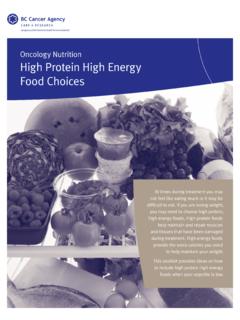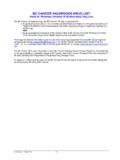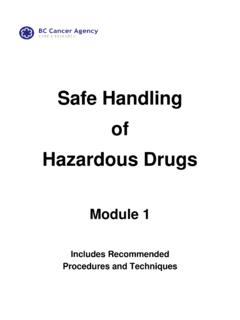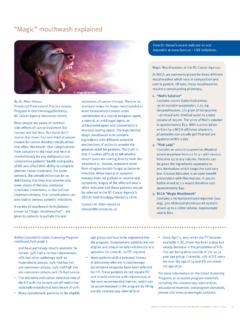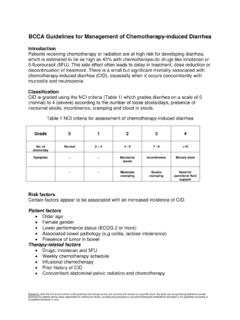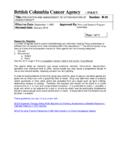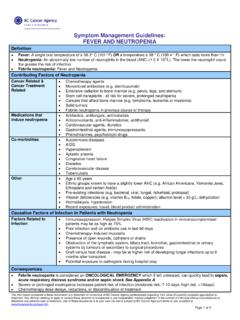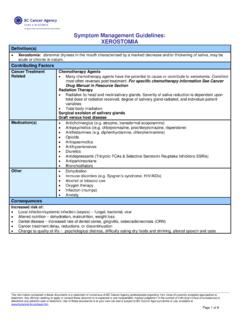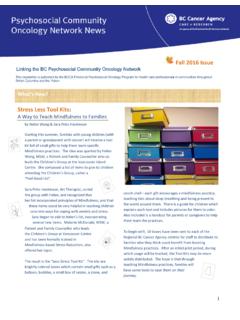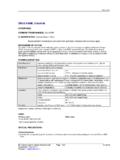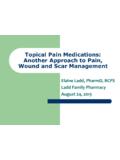Transcription of Symptom Management Guidelines: ORAL …
1 Symptom Management guidelines : oral mucositis . Definition oral mucositis (Stomatitis): An acute inflammation and/or ulceration of the oral or oropharyngeal mucosal membranes. It can cause pain/discomfort and interfere with eating, swallowing and speech. Contributing Factors Cancer Related Cancers of the head and neck ( oral tumors). Cancer Treatment Radiation Therapy: Related Radiation to head and neck, or salivary glands Total body irradiation NOTE: severity of mucositis related to type of radiation, dose per day, cumulative dose and extent of tissue irradiated Chemotherapy: Most Chemotherapeutic Agents have the potential to cause or contribute to oral mucositis .
2 For individual drug risk factor, see BCCA Cancer Drug Manual in resource section NOTE: Continuous or high dose chemotherapy infusions increase risk of severe oral mucositis Chemoradiotherapy: combined chemotherapy and radiation therapy increases risk of developing severe oral mucositis Hematopoietic Stem Cell Transplantation (HSCT). Other Medications causing xerostomia may predispose to oral mucositis : Anticholinergics ( atropine, transdermal scopolamine). Antipsychotics ( chlorpromazine, pro chlorpromazine, risperidone). Antihistamines ( diphenhydramine, chlorpheniramine). Anticonvulsants ( phenytoin). Gabapentin, pregabalin Opioids Smooth muscle relaxants ( baclofen).
3 Steroids ( prednisone, dexamethasone) may predispose to oropharyngeal candidiasis Tricyclic antidepressants ( amitriptyline, imipramine). Periodontal disease: pre-existing dental infections gum disease tooth decay salivary abnormalities Immunosuppression Age: - young children or older adults more susceptible to developing OM. Females Poor oral hygiene Poor fitting dentures Poor baseline nutritional status Dehydration Alcohol or tobacco use Oxygen therapy Consequences Increased Risk for: oral complications : Pain, Infection (local and/or systemic), Bleeding, Xerostomia Risk for severe dehydration, cardiovascular compromise, malnutrition Airway obstruction/ respiratory distress Treatment risks: Chemotherapy/Radiation Therapy dose delays, reductions or discontinuation Decreased quality of life ( psychological distress, problems eating, drinking, swallowing).
4 The information contained in these documents is a statement of consensus of BC Cancer Agency professionals regarding their views of currently accepted approaches to treatment. Any clinician seeking to apply or consult these documents is expected to use independent medical judgement in the context of individual clinical circumstances to determine any patient's care or treatment. Use of these documents is at your own risk and is subject to BC Cancer Agency's terms of use, available at Page 1 of 10. Focused Health Assessment GENERAL ASSESSMENT Symptom ASSESSMENT PHYSICAL ASSESSMENT. Contact and General Normal Vital Signs Information Refer to pretreatment nursing assessment or dental Frequency as clinically Physician name evaluation indicated oncologist, family physician Onset oral Assessment Dentist When did symptoms begin?
5 Equipment required to Pharmacy facilitate assessment: Home health care Provoking / Palliating - Adequate light source Other health care What makes it better? Worse? - Tongue blade, non- providers sterile gloves, clean Allergies Quality (in last 24 hours) gauze Do you have a dry mouth? ( decrease in amount Assess lips, tongue, oral Consider Contributing or consistency of saliva) mucosa: Factors Do you have any redness, blisters, ulcers, cracks, - Bleeding Cancer diagnosis and white patchy areas? If so, are they isolated, - Color note degree of treatment(s) note type, generalized, clustered, patchy? pallor or erythema, date of last treatment presence of white Medical history, including Region / Radiation patches, or discolored pretreatment oral and Where are your symptoms?
6 ( on lips, tongue, lesions / ulcers dental evaluation mouth) - Moisture note any Medication profile accumulation of debris Recent lab and/or Severity / Other Symptoms or coating, diagnostic reports How bothersome is this Symptom to you? (0-10 scale, discoloration of teeth, with 0 not at all 10 being worst imaginable) bad odour Have you been experiencing any other symptoms: - Integrity note any - Fever? possible infection presence of cracks, - Difficulty breathing? possible respiratory fissures, ulcers, distress, airway obstruction blisters - Perception note - Bleeding from oral mucosa? If yes, spontaneous? Location? possible thrombocytopenia ability to swallow, changes in voice tone - Dry mouth, excessive thirst, weakness, dizziness, dark urine?
7 Possible dehydration Hydration Status and - oral pain? Weight - Assess daily oral Treatment intake and output Using any oral rinses? If so, what type? Effective? - Assess mucous Using any pain medications? If so, what type ( membranes, skin topical, systemic)? Effective? turgor, capillary refill Any other medications or treatments? - Amount and character of urine Understanding / Impact on You - Assess weight if daily Functional Alterations? oral intake inadequate - Ability to eat or drink? How much? Weight loss? - Taste changes (dysgeusia)? - Difficulty with speech? - Able to wear dentures? - Interfering with other normal daily activity? Value What is your comfort goal or acceptable level for this Symptom (0 10 scale)?
8 The information contained in these documents is a statement of consensus of BC Cancer Agency professionals regarding their views of currently accepted approaches to treatment. Any clinician seeking to apply or consult these documents is expected to use independent medical judgement in the context of individual clinical circumstances to determine any patient's care or treatment. Use of these documents is at your own risk and is subject to BC Cancer Agency's terms of use, available at Page 2 of 10. oral mucositis GRADING SCALE*. NCI Common Terminology Criteria for Adverse Events (Version ). GRADE 1 GRADE 2 GRADE 3 GRADE 4 GRADE 5. (Mild) (Moderate) (Severe) (Life - threatening).
9 Asymptomatic or mild Moderate pain; not Severe pain; Life-threatening Death symptoms; interfering with oral interfering with oral consequences;. intervention not intake; modified diet intake urgent intervention indicated Indicated indicated *A semi-colon indicates or' within the description of the grade and a single dash (-) indicates a grade is not available *Step-Up Approach to Symptom Management : Interventions Should Be Based On Current Grade Level and Include Lower Level Grade Interventions As Appropriate Management of oral mucositis Grade 1. GENERAL RECOMMENDATIONS FOR. prevention, support, teaching & follow-up care as required Patient Care and New patient baseline assessment Assessment- Nurses to screen for oral mucositis and associated oral complications.
10 Once detected, Including Dental assess at each patient visit Care Provide verbal and written information on maintaining oral hygiene at onset of treatment Maintaining oral health throughout the treatment phase is necessary to: - maintain adequate hydration and nutrition - reduce the incidence, severity and duration of oral mucositis - prevent or minimize the effects of oral complications A dental exam and any interventions should be performed by a dentist (or oral oncology specialist) as early as possible before starting radiation or chemotherapy. oral Hygiene Flossing Floss at least once daily Do not floss if: - Causes pain or bleeding gums which does not stop after 2 minutes 3.
